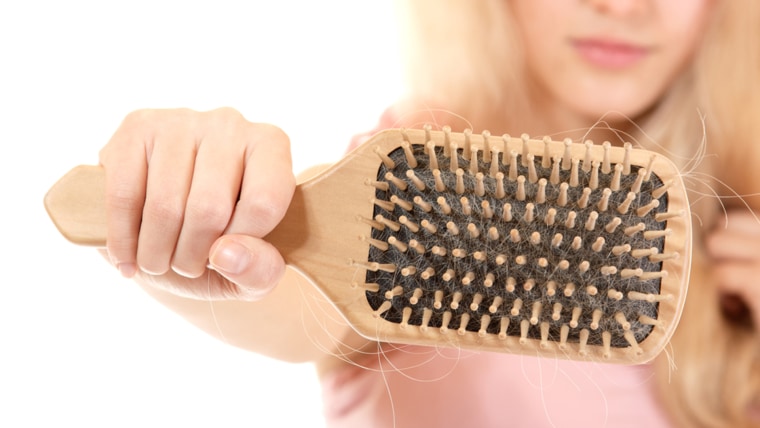Feel like your hair’s getting thinner and there’s less of it? Notice an alarming number of strands on your clothes and in your drain?
You’re not alone: Hair loss affects more than 20 million women in the United States — and the numbers are rising. “Fifteen years ago, women complaining of thinning hair tended to be in their mid-40s,” says Dr. Francesca Fusco, a dermatologist with a specialty in the field. “Now I’m seeing women in their late 20s and 30s coming in to ask about treatments. It can be a huge emotional issue and the stress it causes can exacerbate the problem.”
For women, the most common triggers are hormonal (pregnancy, menopause, thyroid disorders, polycystic ovarian syndrome) or hereditary, but autoimmune conditions and nutritional deficiencies can also be to blame. And unlike men, women tend to lose hair gradually and all over the head, so it can take longer to detect. “Many of my patients notice a change in the shape of their face as the temples recede, a widening of their part line or that their ponytail is smaller in diameter,” says hair restoration specialist Dr. Alan Bauman, who heads the Bauman Medical Group in Boca Raton, Florida.
Luckily, there’s a lot that can be done, from lasers to lotions and everything in between. And you’ll be rewarded for treating it early. “I liken it to sun damage — it’s never too late to address the problem, but it will get worse with time if you don’t slow the progression,” says Bauman. Here, the best, doctor-approved treatments from easy-peasy to full-on offense.
Don’t be afraid to suds up
“When they notice hair falling out in the shower, some women become afraid to wash their hair, which makes things worse,” said Fusco. “Use the pads of your fingers — not your nails — to massage shampoo into the scalp.” And don’t stop there: “It’s a common misconception that the scalp doesn’t need conditioner, but it’s essential for scalp health.” If your hair is oily, fine or limp, look for a lightweight formula designed to bulk up strands.
Get chatty with your colorist
“Hair can be made to look thicker using dimensional coloring techniques,” said Tina Mulryan of New York’s James Corbett Studio, who’s on Fusco’s speed-dial. “Creating various tones can help to reflect light while plumping the hair follicle to give a fuller appearance. All of this can and should be done using gentle hair color products so as to maintain the integrity of fragile hair.” And there’s no need to be shy: “As a stylist we understand how upsetting and embarrassing thinning hair can be for a woman and we know how to discuss the issue in a respectful manner and offer advice and support.”
Vitamins can help (sometimes)
If you’re hoping to grow back healthy locks after experiencing hair loss due to a certain deficiency, vitamins can help. Parks recommends Ducray Anacaps Dietary Supplements and Shah suggests iron, vitamin D and zinc if you’re deficient in them.
At the same time, vitamins aren’t a miracle cure for hair loss. “Nutritional supplements can be very beneficial if you are losing your hair due to a nutritional deficiency,” Kingsley said. “However, if your hair loss is unrelated to diet, nutritional supplements will not remedy it.”
The bottom line? Vitamins won't hurt, but don't rely on them to treat all types of hair loss.
